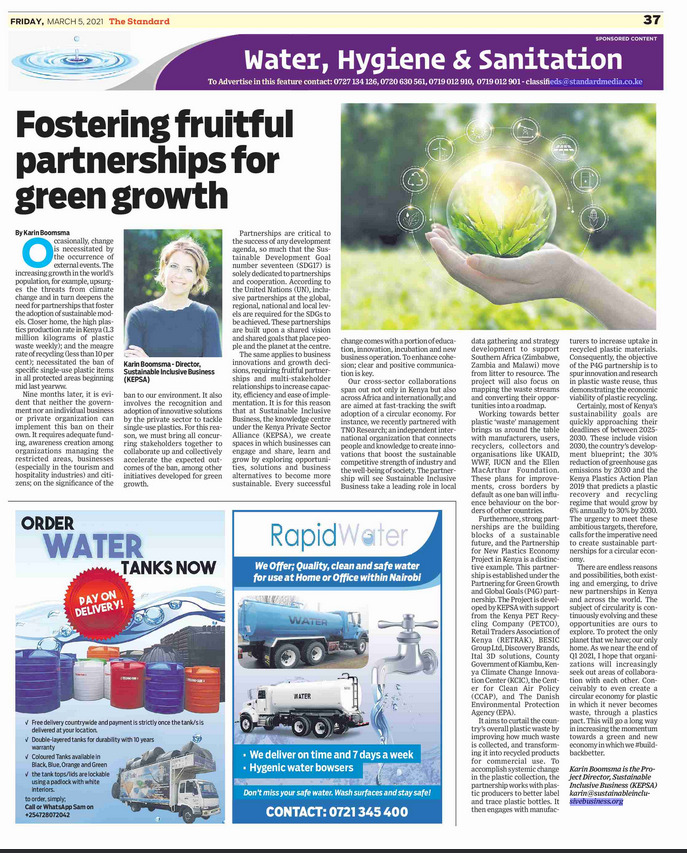Occasionally, change is necessitated by the occurrence of external events. The increasing growth in the world’s population for example, upsurges the threats from climate change and in turn deepens the need for partnerships that foster the adoption of sustainable models. Closer home, the high plastics production rate in Kenya (1.3 million kilograms of plastic waste weekly); and the meagre rate of recycling (less than 10 percent); necessitated the ban of specific single-use plastic items in all protected areas beginning June 2020.
Nine months later, it’s evident that neither the government, nor an individual business or private organization can implement this ban on their own. It requires adequate funding, awareness creation among organisations managing the restricted areas, businesses (especially in the tourism and hospitality industries) and citizens; on the significance of the ban to our environment. It also involves the recognition and adoption of innovative solutions by the private sector to tackle single-use plastics. For this reason, we must bring all concurring stakeholders together to partner up and collectively accelerate the expected outcomes of the ban, among other initiatives developed for green growth.
Partnerships are critical to the success of any development agenda, so much that Sustainable Development Goal number seventeen (SDG17) is solely dedicated to partnerships and cooperation. According to the United Nations (UN), inclusive partnerships at the global, regional, national and local levels are required for the SDGs to be achieved. These partnerships are built upon a shared vision and shared goals that place people and the planet at the centre.
The same applies for business innovations and growth decisions, requiring fruitful partnerships and multi-stakeholder relationships to increase capacity, efficiency and ease of implementation. It is for this reason that at Sustainable Inclusive Business, the knowledge center under the Kenya Private Sector Alliance (KEPSA), we create spaces in which businesses can engage and share, learn and grow by exploring opportunities, solutions and business alternatives to become more sustainable. Every successful change comes with a portion of education, innovation, incubation and new business operation. To enhance the cohesion; clear and positive communication is key.
Our cross-sector collaborations span out not only in Kenya, but also across Africa and internationally; and are aimed at fast-tracking the swift adoption of a circular economy. For instance, we recently partnered with TNO Research; an independent international organization that connects people and knowledge to create innovations that boost the sustainable competitive strength of industry and well-being of society. The partnership will see Sustainable Inclusive Business take a leading role in local data gathering and strategy development to support Southern Africa (Zimbabwe, Zambia and Malawi) move from litter to resource. The project will also focus on mapping the waste streams and converting their opportunities into a roadmap.
Working towards better plastic ‘waste’ management brings us around the table with manufacturers, users, recyclers, collectors and organisations like UKAID, WWF, IUCN and the Ellen MacArthur Foundation. These plans for improvements, cross borders by default as one ban will influence behaviour on the borders of other countries.
Furthermore, strong partnerships are the building blocks of a sustainable future, and Partnership for New Plastics Economy Project in Kenya is a distinctive example. This partnership is established under the Partnering for Green Growth and Global Goals (P4G) partnership. The Project is developed by KEPSA with support from the Kenya PET Recycling Company (PETCO), Retail Traders Association of Kenya (RETRAK), BESIC Group Ltd, Discovery Brands, Ital 3D solutions, County Government of Kiambu, Kenya Climate Change Innovation Center (KCIC), the Center for Clean Air Policy (CCAP), and The Danish Environmental Protection Agency (EPA).
It aims to curtail the country’s overall plastic waste by improving how much waste is collected, and transforming it into recycled products for commercial use. To accomplish systemic change in plastic collection, the partnership works with plastic producers to better label and trace plastic bottles. It then engages with manufacturers to increase uptake in recycled plastic materials. Consequently, the objective of the P4G partnership is to spur innovation and research in plastic waste reuse, thus demonstrating the economic viability of plastic recycling.
Certainly, most of Kenya’s sustainability goals are quickly approaching their deadlines of between 2025-2030. These include vision 2030, the country’s development blueprint; the 30% reduction of greenhouse gas emissions by 2030 and the Kenya Plastics Action Plan 2019 that predicts a plastic recovery and recycling regime that would grow by 6% annually to 30% by 2030. The urgency to meet these ambitious targets therefore, calls for the imperative need to create sustainable partnerships for a circular economy.
There are endless reasons and possibilities, both existing and emerging, to drive new partnerships in Kenya and across the world. The subject of circularity is continuously evolving and these opportunities are ours to explore. To protect the only planet that we have; our only home. As we near the end of Q1 2021, I hope that organizations will increasingly seek out areas of collaboration with each other. Conceivably to even create a circular economy for plastic in which it never becomes waste, through a plastics pact. This will go a long way in increasing the momentum towards a green and new economy in which we #buildbackbetter.
Karin Boomsma is the Project Director, Sustainable Inclusive Business (KEPSA)
karin@sustainableinclusivebusiness.org
The opinion piece was first published on the Standard Newspaper.


